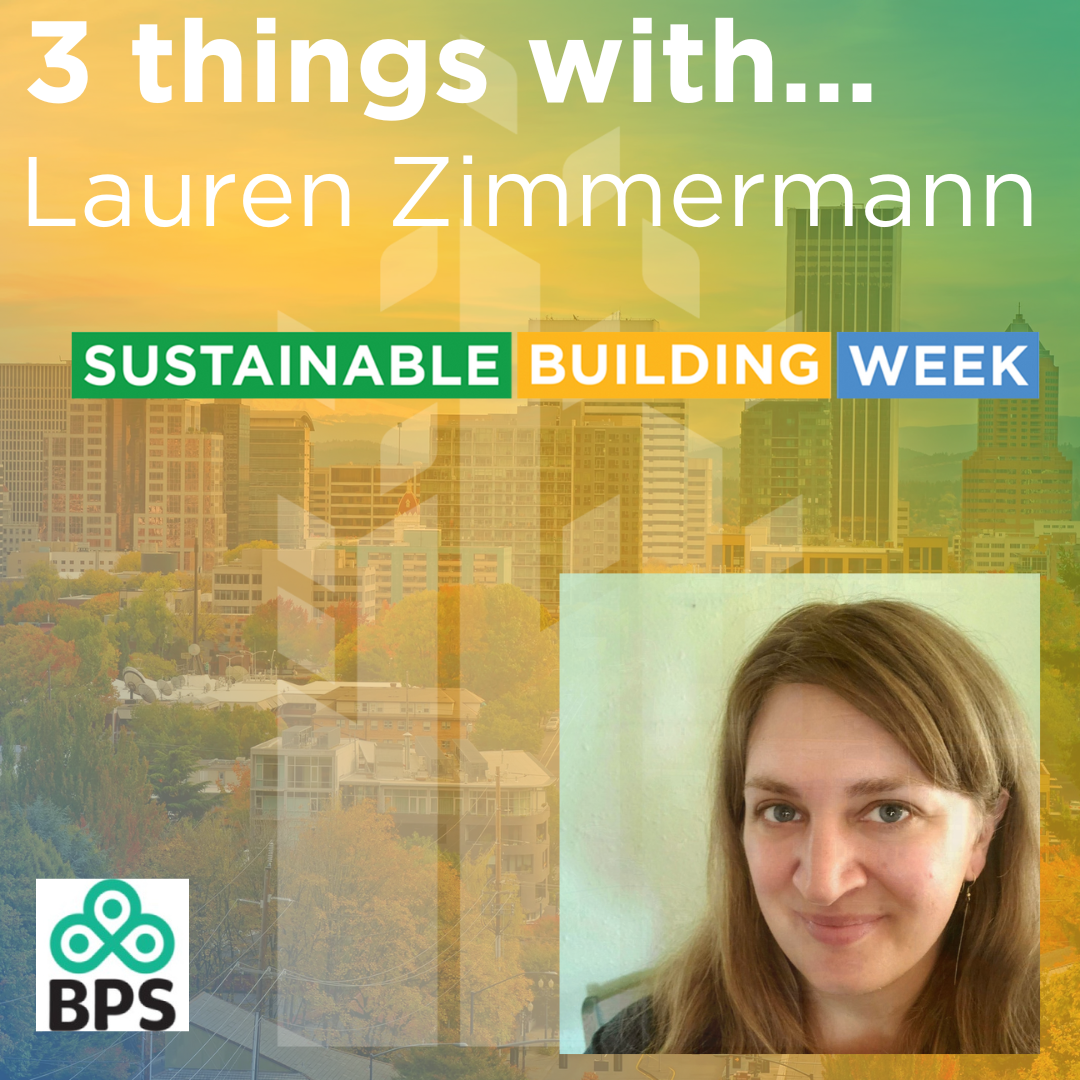3 Things with … Lauren Zimmermann

3 Things with … Lauren Zimmermann
Portland has an amazing sustainability community and we want to highlight the amazing people and work that shapes our unique city. We’re sharing their answers to questions we posed.
Meet Lauren Zimmermann, Embodied Carbon Analyst, with the Portland Bureau of Planning and Sustainability. In her role, she conducts research and collaborates with City of Portland bureaus, cities, regional and international councils, and academic institutions to develop policies that reduce the embodied carbon of building materials, construction processes, and waste management practices. She’s also a task force member with the Pacific Coast Collaborative initiative.
Take it away, Lauren!
What does sustainable mean to you?
I consider sustainability a holistic practice of achieving goals with as little environmental impact as feasible or a net-positive environmental impact. In the built environment, we tend to focus on operational carbon emissions because it is tangible on our electricity bill. If we incorporate consumption based emissions, this addresses the embodied carbon of our decisions, such as purchasing building materials manufactured across the world, the trucking delivering our goods, packaging, and waste. Our quality of life is maintained and improved by the goods and services we use over time, so convincing humans to never go out to dinner, buy a new shirt, or travel to an interesting place again is not feasible. Ideally, individuals would take into consideration all the operational and embodied carbon effects of their lifestyle, but who has time for that? This is why I work in policy, because I understand that changing individual behaviors is not enough to meet the challenge of the climate crisis.
Name a Portland (or Oregon) project or collaboration that has inspired you, and tell us why you are inspired by it.
The Hacienda CDC Mass Casitas affordable housing construction program is one of the most innovative collaborations on the West Coast. There is a misconception that new housing construction cannot meet the goals of energy efficiency, regionally sourced materials, quick completion timeline, and the golden ticket of affordability. These modular homes hit all these points, plus when you manufacture houses in a central facility, you save on materials, create training opportunities, improve quality control, and potentially tighten timeframes on permitting processes. Currently they are producing one and three bedroom homes. These compact units can be trucked across Oregon to communities who have available land but need housing such as the area of Otis, which lost hundreds of homes in the 2020 Echo Mountain fire. They also have a goal to develop a stackable module for multi-family dwellings that could help meet Multnomah County’s housing needs in the coming years.
To solve our concurrent challenge of housing and climate change, we need innovative design and production options beyond the current development paradigm. The Mass Casitas are proof that a quality and healthy home is not reserved for high income luxury units. Focusing on locally produced low-carbon materials, such as the mass plywood panels (MPP) manufactured by Freres has a dual benefit of low-embodied carbon materials and an increase in good green jobs for the region.
What can Portland (or Oregon) be doing better to be more sustainable?
Hopefully as designers, planners, and policy writers, we have all learned about the history of discriminatory redlining that shaped and segregated Portland along with cities across the country. When we look at the massive detrimental effects these policies caused across low-income communities and communities of color, we should use an inverted model of impact. We should greenline Portland’s historically disinvested neighborhoods, promoting healthy, comfortable, energy efficient housing in those areas. Converting central Portland buildings from commercial to residential uses would create good jobs, deepen our network of neighborhood community hubs, improve our resilience to the effects of climate change, and get it done with drastically less embodied carbon by using fewer building materials than constructing new ones.
The development of policy at any level is a slow moving ship. Historically, this is important to ensure cohesion, safety, access, and livability of areas of the city under various land use guidance, infrastructure planning, waste management, etc. However, policy is not our only tool, and climate change is accelerating too quickly to rely on these traditional methods. The Portland Clean Energy Community Benefits Fund is an example of an unprecedented program that invests real dollars in frontline communities. I’d love to see a creative solution that takes advantage of streamlined permitting, zoning changes, or a non-privatized financing institution that allows us to meet our housing needs while minimizing greenhouse gas emissions.
Recent News
September 23, 2024
September 09, 2024
September 19, 2023
Stay in the Know!
© 2024 Sustainable Building Week. Website by Triple Play Studio


